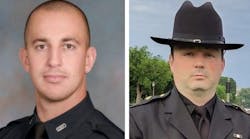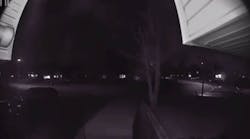On a May evening in 2006, Frank Craig was a few hours away from a better life for his family of five.
Court records show that the Army veteran was set to start a new job with the state, with solid pay and benefits, until Chicago police hauled him out of his house in his boxer shorts.
No judge had signed a warrant for Craig's arrest. Instead, police themselves had issued an "investigative alert" ordering Craig's arrest for a robbery that occurred four months earlier.
The alert was based on detective work later judged so shoddy that it led to taxpayers reimbursing the innocent man half a million dollars for a false arrest that caused him to lose his job and the family home to foreclosure.
The false-arrest case -- settled in December 2011 -- spotlighted an increasingly controversial policy in Chicago that carries the risk of both hurting the innocent and helping the guilty.
Critics say the internal police alerts, absent a bona fide warrant, sidestep constitutional protections. Officers act like judges, critics argue, in a process so open to abuse that the police-issued alerts are rarely allowed into the FBI's fugitive database used by police across the country.
An Illinois appellate judge who was once a police officer recently called for alerts to be banned.
"It's so easy for (police) to get a warrant. They should just do it right," said that judge, Marcus Salone.
It's unclear how often Chicago police pick alerts over warrants, but as of the most recent count, there were at least 2,000 active alerts ordering someone's arrest -- about a fourth for serious, violent crimes.
But police and prosecutors note that alerts are legal, and some Chicago officers say forcing them to get warrants for every case would handcuff understaffed detectives trying to nab suspects amid a surge in killings.
"We're accountable for all these murders and violent crime, but yet every five minutes we're getting tools taken away from us," said Detective Saul Del Rivero, a representative with the Chicago Fraternal Order of Police.
Legal gray area
The courts say the Constitution doesn't necessarily require a warrant to arrest someone. That's particularly true of cases of hot pursuit when police witness a crime. But the leeway gets murkier the more time elapses between the crime and the arrest, especially when police want to arrest the suspect in his or her home.
The common protocol across the country is for police, when time allows, to ask prosecutors to seek an arrest warrant from a judge. If the judge decides there is "probable cause" to believe the suspect committed the crime, a warrant is issued. That becomes the legal OK to arrest the suspect.
But in some bigger cities and counties, police at times skip the warrant process and issue their own internal alerts. Some request that suspects voluntarily submit to questions. Others order suspects' immediate arrest. New York and Chicago have been issuing both kinds of alerts for decades, with Chicago critics homing in on the more powerful alerts that order immediate arrests.
The Chicago Police Department declined to answer questions on its use of alerts that order arrests, instead issuing a short statement calling them a "viable investigative tool."
Officers separately interviewed by the Tribune defended the alerts as key to catching suspects, particularly in fast-moving cases where there may be just enough evidence to arrest someone, but not enough for prosecutors to file formal charges, and detectives are eager to question a suspect.
Del Rivero handled Chicago homicide cases for years before taking a leave of absence to work with the police union. He said detectives do seek warrants at times, but the process can take several hours and may be fruitless in borderline cases if prosecutors insist on additional evidence before they'll sign off.
"Realistically, when we have these cases, we have very little, next to nothing," he said. "If I have a suspect that's out there, and I don't have enough physical evidence, and I have one or two witnesses, and we're being told this individual is involved, how am I going to find this individual? What should we do? What is our responsibility to the public?"
The Cook County state's attorney's office said it has no problem with the use of alerts, which don't appear to be used "in lieu of a warrant," said chief criminal prosecutor Fabio Valentini.
But one former prosecutor, Torreya Hamilton, argued the opposite.
Hamilton is now a civil rights attorney who represented Craig, and she said the point of a warrant is for a neutral observer -- a judge -- to agree that enough evidence exists for police to arrest someone.
"They are not supposed to be arresting people and then building a case against them," she said. "It's supposed to go the other direction."
By late last year, Salone and another high-ranking judge argued the process had gotten out of control.
A judge's rebuke
In that case, a three-person panel of state appellate justices fielded a case of a man arrested on an investigative alert and later found to have an illegal gun.
The appeals court overturned the gun conviction. All three judges said prosecutors didn't prove the alert was backed by legitimate probable cause to arrest the man.
Salone and another judge went much further in a concurring opinion. Joined by Judge P. Scott Neville, Salone called for a stop to an alert system that had become an "end run" around the Constitution.
"Police officers cannot grant themselves unbridled power to take into custody persons without the benefit of an arrest warrant, save the exceptional circumstances already present in case law," Salone wrote in one of his last decisions before retiring.
Salone's side opinion, however, carries little legal weight because it wasn't the panel's official decision.
Still, the Justice Department -- and Illinois State Police -- have a hidden penalty for the alerts.
The FBI maintains a database that has become a staple of officers across the country to check the backgrounds of nearly all those stopped by police. It has repeatedly been credited with helping nab fleeing fugitives. State police have a similar database for Illinois fugitives. But both accept only entries backed by warrants or the promise that police are trying to get them in the next 48 hours. Chicago alerts rarely make the cut.
That means if a suspected Chicago killer is sought on an alert -- versus a warrant -- the fugitive could be stopped by police in Naperville or Gary and be let go, because the police databases they check wouldn't show the alert.
It's unclear just how often that's happened.
Chicago police won't release the names of those sought on alerts -- making it practically impossible to see if any have been stopped and let go by police elsewhere. But a review of active alerts for violent crimes found that many have lingered for months and years, increasing the odds that police elsewhere could have come across the suspects.
The policies of the FBI and state police are based on legal risk. Warrants insulate police from most false-arrest claims, but alerts don't. So if police elsewhere arrest someone on an alert based on shaky evidence, the arresting department could be sued for false arrest.
The legal risk can be seen in the case of Frank Craig.
'Leap in logic'
Court records show that Craig's saga began with an armed robbery in Logan Square in 2006.
The victim told police the gunman was a short black man in his 30s. Police traced the getaway car's license plate to a rental car lent to a California woman named Jane Craig, court records show. Looking for any acquaintances she may have in Chicago, officers dug up an old Chicago police report she filed. Also listed in the report was someone who shared her California address and last name: Frank Craig.
Investigators thought maybe he was one of the robbers. Had they dug deeper, they would have learned that Frank Craig from California had died two years before the robbery, records show.
Instead, the investigators took what U.S. District Judge William Hibbler would later describe as a "grandiose leap in logic."
Officers looked for any short, middle-aged black man in Chicago named Frank Craig. And in a city of 3 million people, they found one: Frank Craig, 43, who lived in Morgan Park.
Court records indicate this Frank Craig was an Army veteran turned security guard who had previous scrapes with the law. He got probation for battery in 1995 and was arrested for allegedly carrying an illegal gun in 1992, 1998 and 2005.
None of the gun arrests led to a conviction. And officers could find nothing to link the Frank Craig of Morgan Park to the Frank or Jane Craig of California.
Still, officers forged ahead. They pulled the 1998 booking photo of the still-living Frank Craig -- when his age was closer to that of the described gunman -- and put it beside pictures of mostly older black men in their late 40s. In a process Hibbler later called "unduly suggestive," police showed the pictures to the victim, who picked out the 1998 version of Frank Craig as the robber.
Experts have long cautioned that victims often get just a glimpse of a suspect and can mistakenly identify someone else in lineups, particularly when police surround the suspect with people of little resemblance. That's why police are supposed to use people who look similar and, before putting a suspect in a lineup, link him or her somehow to the crime.
Officers found no corroborating evidence but still pushed their bosses to issue an alert. The case languished for nearly four months until one day a supervisor -- saying he believed officers had gotten more evidence -- issued an alert for Craig's arrest.
The $570,000 alert
The next night, officers burst into Craig's small bungalow.
Craig said he awoke to the commotion and came downstairs in his boxer shorts and a T-shirt. The men asked him if he was Frank Craig. He said yes. They hauled him out of the house, eventually let him put on pants, and took him to a cold jail cell. He insisted all along that they had the wrong guy, to no avail.
"I sat in a cell, thinking I was going to get out, thinking it was a mistake," he said.
At the time of his arrest, Craig was a few hours away from starting his first overnight shift of a $44,000-a-year job with the Illinois Department of Transportation. It was a job that was supposed to help the family of five dig out of a financial hole. But Craig wouldn't make it out of jail for two months -- crippling the family budget.
Hamilton, one of Craig's lawyers, said the alert wasn't the only problem with how authorities handled the case. They didn't drop charges even after realizing the Frank Craig in jail wasn't related to the California woman, which forced the case to trial, when Craig was exonerated.
But, she said, had police sought a warrant for Craig, a prosecutor would have been more likely to press for corroborating evidence and better understand the nuances of the case before authorizing the next step. Hibbler, the judge in the civil trial, questioned why police didn't seek a warrant.
"The officers, perhaps realizing the weakness of their case, did not even attempt to obtain a warrant, instead seeking an investigative alert," Hibbler wrote.
In December 2011, after Hibbler refused the city's request to dismiss the civil case, the city paid Craig $280,000 and covered $290,000 in his legal fees to drop his lawsuit.
Another lawyer of Craig's, Tony Thedford, said he suspects there are far more abuses of alerts that he hopes one day will prompt the courts to limit their use.
"If people knew how often this happens, and if they knew the destruction of lives based on essentially Chicago police internal policy to circumvent the Constitution, people would be outraged," Thedford said.
But Del Rivero said alerts remain a fair and easier way for a short-staffed department to get suspects arrested. He said the department should hold supervisors accountable for issuing bad alerts and not hinder the vast majority of detectives who use them legitimately to catch criminals.
"If there were problems in our cases, if there was some shoddy work, let's clean up the process," he said. "Let's not throw out the tool."
Copyright 2013 - Chicago Tribune
McClatchy-Tribune News Service


